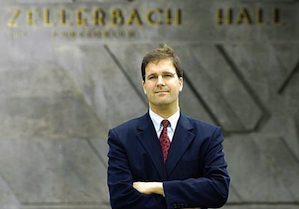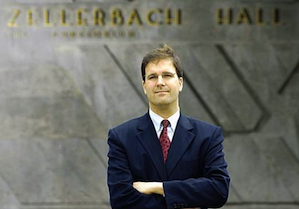
Photo by Kat Wade
Cal Performances Director Matías Tarnopolsky will host a symposium this Wednesday and Thursday, Nov. 28 and 29, called “Reaching for the Stars: A Forum on Music Education.” Speakers will include, among others, Gustavo Dudamel and Dr. José Antonio Abreu.
Dudamel, 31, is the principal conductor of the Gothenberg Symphony; music director of the Los Angeles Philharmonic; and artistic director of the Orquesta Sinfonica Simon Bolivar in Caracas, Venezuela. Dr. Abreu, 73, is the Venezuelan pianist, economist, politician, and educator who in 1975 founded El Sistema, formally known as the Foundation for the National Network of Youth and Children Orchestras of Venezuela.
SFCV spoke with Tarnopolsky a few weeks ago about El Sistema and whether that model might be adopted in the U.S.
Why is it that we could not construct that strategy in this country?
We could and we should.
But how do you make it work, how do you sell it?
I think you do it and then it sells itself. What we’re seeing, around the country, and around the world now, is El Sistema taking root. Who’d have thought that in Venezuela you’d have the most effective, widespread music system anywhere? That’s a sort of arrogant Northern Hemisphere Western view, which I don’t subscribe to, but I think the idea here is that the values intrinsic in making music, be it playing a musical instrument or just banging a drum or singing, cut across all obstacles that society and our culture can put in its place. With a fair amount of stimulation, the values of El Sistema can take root in this country, and we’re trying to play our part with the visit of the Simon Bolivar Orchestra for this two-day symposium that includes experts from our own community, from around the country, and from around the world.
This is how Cal Performances is putting its stake in the ground and saying, “We not only have to protect but also expand music education in the public schools in our area.” Because it’s woeful that kids in public schools have as little as half-an-hour a week. It’s just not right. …
When you say “it’s not right,” is there not a growing body of evidence that suggests a correlation between classical music and focus in the classroom?
Yes, and that’s not only well-known but accepted. We know that it helps with concentration, critical thinking, and seeing things in different ways. Let’s just look at what happens when you play in an orchestra. You have to learn very quickly when to lead and when to follow. You have to absolutely understand the difference between listening and hearing. You have to understand issues of great sophistication at a very early age, like the difference between the weight of sound and the volume of sound, which applies to everything you do.
The other forum where I’ve witnessed this transformative effect of putting young people together in a musical setting is the West-Eastern Divan Orchestra, which is the orchestra that Daniel Barenboim and Edward Said started in 1999. They brought together kids from Israel and neighboring Arab countries, kids who very likely may have been in their country’s military. The point is that these kids had no choice when it came to sharing a music stand — as Barenboim put it, “to breathe from the same lung” — but in a very short time the essence of human relationships, regardless of who you are or where you’re from, shines through.
What’s the role of the public sector in supporting El Sistema?
If you look at the history of El Sistema, it came out of the Ministry of Health, not the Ministry of Education or the Ministry of Social Welfare or whatever it was called then. The idea that Dr. Abreu promulgated was to get kids off the streets, to engage them in something meaningful and valuable. …
What we’re seeing, around the country, and around the world now, is El Sistema taking root.
But, talking about America, how could you get something like El Sistema here? You’ll never get government to get behind it, will you, especially now?
Why not? I mean, I don’t think we will, either, in the immediate future. The whole arts and educational funding conversation right now in this country is not healthy. But I think government funding of the arts actually is a good thing. It’s a question of degrees. It would be nice to have a little bit more; some people think it should be a little bit less. When governments fund the arts, like they do very generously in many European countries, and they fund arts education, as well, they tend to get good results, and it shows that society as a whole cares about the arts and culture. It also says, as a society, that we not only believe in feeding the hungry and clothing our poor and healing our sick but also nourishing the minds of the whole society.
But it shouldn’t be one or the other. Like I said, it’s a question of degrees, and the debate in this country right now is very complicated and very polarized. What’s getting lost are those artistic values that I’ve talked about. But, in answer to your question, we should dream big in this country and try to have a national system. I think eventually there will be a critical mass, and whether it’s in Los Angeles or Chicago or New York, New Jersey, or wherever, these things are happening — and there will be more and more orchestras, and more and more chamber groups.
So is it finally up to the musical “establishment,” including educators, musicians, and conductors, to extend this outreach?
That gap has long been filled, at least partly, by arts organizations like ours or the San Francisco Symphony, which has its [own] education program, by sending performing artists out to the schools or [connecting] kids with performing artists. Our education program [at Cal Performances] is part of our DNA. We do in excess of 60 education and community programs every year, mostly free. Ten of those are main stage performances at Zellerbach Hall during the school days. So that’s 2,000 kids each time. And in advance of every one of those performances our teaching artists go into the schools and work with both kids and teachers to prepare them for the performances. And then, afterwards, often the artists will interact with the children.
But that’s still not the same as music being part of the curriculum. As a very dear composer friend of mine said to me, “Why is it that the swim team meets at 7 a.m. every morning and not the orchestra or the band?” That’s what we must get to.
When governments fund the arts, like they do very generously in many European countries, and they fund arts education, as well, they tend to get good results.
Should the nature of this responsibility be part of the curriculum in music schools?
Yes, and I can tell you that the conversation in the culture of these organizations is changing, certainly at places like Curtis and Juilliard [music schools]; the conversation is changing. And it is much more about creating the idea of community musicians. So not only are you a brilliant pianist or violinist, but you have the capacity and the ability to go into a school and teach a group of kids, or to start a chamber music series in your community, or do groups of adult music-making.
One of the great examples of this is a young trumpeter I met at Curtis. (I’m on the board of overseers at the Curtis Institute of Music.) His name is Stanford Thompson, a Curtis graduate who stayed on in Philadelphia to start an organization called Play on Philly. It’s an after-school program for kids where, instead of just hanging around waiting for their parents to come home from work every day, they come and play music. I’ve invited Stanford to be part of our symposium. That’s a great example of someone, who graduated from a classic conservatory, going out and doing this work of the citizen musician. …
And this is why, for example, our education director sits on our programming team. Basically, every artist who comes here does some kind of residency program, either with students on the campus or with kids in schools. Dudamel himself will be conducting the UC Berkeley Symphony Orchestra in a master class. Same with Esa Pekka Salonen [Dudamel’s predecessor at the L.A. Philharmonic]. Same, last year, with Valerie Gergiev. This is essential to what we do.
For us, education is as important as our main stage artistic programs. The two work together, and it’s particularly interesting for us to be on a university campus. The Mellon Foundation just funded us with more than three quarters of a million dollars over five years to better [connect] our artistic programs with campus academic programs. So that really sets UC Berkeley apart in terms of the kind of experience students can have.
I want us to have music education as part of the everyday conversation, not as this “special thing.” And that’s not happening yet. But that’s what Stanford has achieved in Philadelphia and what El Sistema has achieved in Venezuela. This is the message we want to get across — that we need to be even better advocates.

